- March 6, 2024
- LOSCO
- 0 Comments
- Blog, News, Uncategorized
ITS POSSIBLE TO WIN THE WAR AGAINST WOMEN’S PROPERTY AND LAND RIGHTS IN KIGEZI AND UGANDA
LOSCO a Human Rights Advocacy Organisation coordinating the Kigezi sub region has since 2019 been involved in Policy Advocacy and Social accountability and governance to deconstruct certain social norms, values in the gender aspect, and has played a big role in community empowerment and capacity building on Women Rights, laws and policies handling a wide range of social justice issues, women land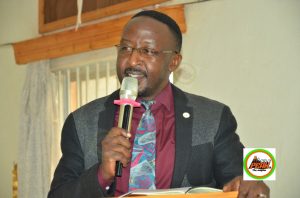 ownership, gender-based violence which continue to constitute serious social welfare issues, women land rights and social equity issues that affect millions of women and girls in sub – Saharan Africa and women’s land rights are a fundamental human right. They are foundational to gender equality, power dynamics, dignity, household decision-making, and economic freedom. Strong land rights help women break the cycle of poverty and improve not only their own lives, but those of their families and whole communities. The benefits of women’s land rights multiply in crucial ways both at home through their investment in children’s education, health and wellbeing, and Kigezi faces violent cases including deaths related to women land ownership due to limited knowledge on the legal provisions especially the Succession Act, Cap 162 – to address the gaps in the current Act including providing for gender equality in matters of succession in accordance with articles 21 and 33 of the Constitution.
ownership, gender-based violence which continue to constitute serious social welfare issues, women land rights and social equity issues that affect millions of women and girls in sub – Saharan Africa and women’s land rights are a fundamental human right. They are foundational to gender equality, power dynamics, dignity, household decision-making, and economic freedom. Strong land rights help women break the cycle of poverty and improve not only their own lives, but those of their families and whole communities. The benefits of women’s land rights multiply in crucial ways both at home through their investment in children’s education, health and wellbeing, and Kigezi faces violent cases including deaths related to women land ownership due to limited knowledge on the legal provisions especially the Succession Act, Cap 162 – to address the gaps in the current Act including providing for gender equality in matters of succession in accordance with articles 21 and 33 of the Constitution.
The Campaign for Stand4Herland started in 2021 and Local Sustainable Communities Organisation (LOSCO) a not-for- profit Non- Governmental Organisation that was initiated by a group of Human Rights Defenders, Social Workers, Women Leaders, and Local Community Development Workers to bring about practical inclusive development through promoting inclusive policies and practices; a legally registered Non-governmental organisation with a mandate “To facilitate stable and sustainable community development” in the whole country with her Offices in Kabale Municipality – Kigezi Sub Region represented at the strategic planning meeting and has since led the coordination in the region and recently joined by KWID and has been a very present force in the formulation journey of Stand4Herland Campaign from the start when the joint strategy was developed for the five years campaign journey having been a member of the National Land Coalition that was originally National Engagement Strategy which is a member of the International Land Coalition.
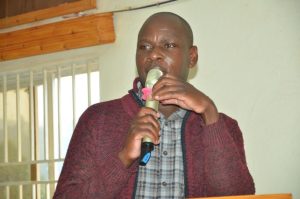
LOSCO has been progressively building capacity of other stakeholders since many women face barriers to Social Justice through Press briefs, Policy dialogues and workshops, with boundary stakeholders and has been a very present force in the formulation journey of Stand4Herland Campaign from the start where the joint strategy was developed for the five years campaign journey having been a member of the National Land Coalition that was originally National Engagement Strategy which is a member of the International Land Coalition.
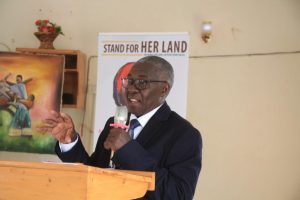 LOSCO held a dialogue in the district to advance the Stand for Her Land campaign (S4HL) which is a global advocacy campaign to strengthen the land rights of millions of women through collective advocacy that aims to close the implementation gap between law and practice especially; will making, (how it is made and who makes it), addressing letters of administration and property ownership for women in partnership with Uganda Community Based Association for Women and Children’s Welfare (UCOBAC) and Stand for Her Land Campaign (S4HL). S4HL is an inclusive, collaborative effort among a diverse group of allies including representatives of civil society, development organizations, women’s rights and empowerment groups, land rights advocates, Land mapping and technical specialists all over the world. Advocacy for women land and inheritance rights is an investment in the sustainable development of rural areas, poverty reduction, gender equality, and overall community well-being. LOSCO in Partnership with UCOBAC is currently coordinating the Stand For Her Land Campaign in Uganda under a 5 year project funded by BMZ and led by Landesa and LOSCO is taking the lead in the Campaign in Kigezi Sub region advancing the plight of women through Land Rights advocacy, Legal redress, policy reviews and capacity building having been and is an active member of the National Land Platform involved in the review of the National Land Policy and is a strong member of UCOBAC representing Western Uganda being a part of all the land related discussions in the region.
LOSCO held a dialogue in the district to advance the Stand for Her Land campaign (S4HL) which is a global advocacy campaign to strengthen the land rights of millions of women through collective advocacy that aims to close the implementation gap between law and practice especially; will making, (how it is made and who makes it), addressing letters of administration and property ownership for women in partnership with Uganda Community Based Association for Women and Children’s Welfare (UCOBAC) and Stand for Her Land Campaign (S4HL). S4HL is an inclusive, collaborative effort among a diverse group of allies including representatives of civil society, development organizations, women’s rights and empowerment groups, land rights advocates, Land mapping and technical specialists all over the world. Advocacy for women land and inheritance rights is an investment in the sustainable development of rural areas, poverty reduction, gender equality, and overall community well-being. LOSCO in Partnership with UCOBAC is currently coordinating the Stand For Her Land Campaign in Uganda under a 5 year project funded by BMZ and led by Landesa and LOSCO is taking the lead in the Campaign in Kigezi Sub region advancing the plight of women through Land Rights advocacy, Legal redress, policy reviews and capacity building having been and is an active member of the National Land Platform involved in the review of the National Land Policy and is a strong member of UCOBAC representing Western Uganda being a part of all the land related discussions in the region.
Article 21 of the constitution of the Republic of Uganda prohibits gender discrimination generally and enshrines the principle of equality before the law, regardless of sex, race, color, ethnicity, tribe religion political belief, social or economic standing.
Article 26(1) is to the effect that every person has a right to own property and this article is about protection from deprivation of property.
Article 31 provides for equal rights between men and women during marriage and divorce.
Article 33 pertains specifically to the rights of women and requires as follows;
- a) The government must provide opportunities to enhance the welfare of women and enable them reach their full potential.
- b) Women have rights equal to men in areas including political, economic and social activities.
- c) Laws, customs, traditions and cultures that are “against the dignity of women” are prohibited by the constitution.
Section 15 of the Judicature Act permits the courts to apply customary law and allows any person to benefit from a custom unless the custom has been declared to be repugnant to natural justice, equity and good conscience, and not compatible with any written law.
Such customs and practices must pass the “Repugnancy test” before being applied or relied upon.
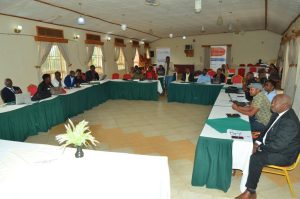 Repugnant meaning something characterized by contradictions and irreconcilability.
Repugnant meaning something characterized by contradictions and irreconcilability.
Incompatible meaning such a custom must not be clashing, conflicting, disagreeing or inconsistent with any written law of the land.
LOSCO has established relationship contacts with local structures as Uganda Police, Uganda Association of Women Lawyers (FIDA Uganda). NPOs. LOSCO also worked with Members of Parliament, Uganda Law Society (ULS), and Opinion leaders through this dialogue.
It was a Half-day policy review dialogue with only 30 participants– (Males 16 and Females 14) with age range of 18-34 – 15, 35-59 – 12 and 60+ 03 taking form of plenary and dialogue where four panelists, twenty one leaders and five media persons were in one room.
The Overall Goal of this project was to promote women’s land inheritance rights and property ownership through legal and policy review, the exchange of experiences and good practices among the boundary stakeholders in Kabale District.
The Specific Objectives were;
- To build capacity of state and non-state institutions in Land and inheritance rights for Women and Property ownership theory and methodology through knowledge sharing and innovations and propose Key policy recommendations, directions and possible solutions to address policy implementation gaps in Kigezi.
- Provoke discourse and encourage dialogue around policy and practice and shape opinions to amplify grassroots women’s voices, lived experiences and shared priorities promote women’s land and inheritance rights critical to the development and growth.
In Partnership with UCOBAC, LOSCO came in with an effort where a dialogue was held involving the Duty Bearers, target stakeholders ranging from and inclusive of leaders from the District Local Governments who are the direct service providers, women and young girls, men, police, politicians, representatives from Religious leaders, UHRC, CSOs members, journalists, Community Leaders to address the issue of WOMEN LAND, INHERITANCE RIGHTS AND PROPERTY OWNERSHIP IN KABALE DISTRICT – KIGEZI SUB REGION.
Outcome 1: Capacity built among the Rights Holders and Duty Bearers (State an Non state actors) on Land, marriage and inheritance rights for women and property ownership theory and methodology
Outcome 2: Collaboration and continuous engagement between State and non-state actors on land rights, and women property ownership to amplify grassroots women’s voices, lived experiences and shared priorities promote women’s land and inheritance rights critical to the development and growth..
Overview of WOMEN LAND, INHERITANCE RIGHTS AND PROPERTY OWNERSHIP IN KABALE DISTRICT – KIGEZI
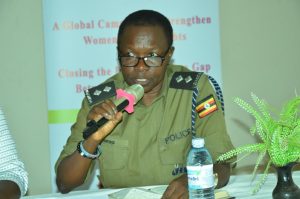 There are very many cases in Kabale where fathers give women land even in writing and they are taken away by the siblings that women are not supposed to possess land and yet there is nowhere the constitution says ladies should not inherit land. Findings revealed that the number of land related complaints particularly reported by women at Kabale Central Police Station and the Office of the Kabale Resident District Commissioner has steadily increased to an average of 21 per month. The conflicts were breaking families with children also affected, since the warring parties spend most of their time in courts of law and at police registering 8 to 10 land cases every week, also revealing that majority of the cases are reported by women. This is not an easy thing because some women believe they are not supposed to get land from their families attributed to limited awareness of the public on laws governing land ownership and management.
There are very many cases in Kabale where fathers give women land even in writing and they are taken away by the siblings that women are not supposed to possess land and yet there is nowhere the constitution says ladies should not inherit land. Findings revealed that the number of land related complaints particularly reported by women at Kabale Central Police Station and the Office of the Kabale Resident District Commissioner has steadily increased to an average of 21 per month. The conflicts were breaking families with children also affected, since the warring parties spend most of their time in courts of law and at police registering 8 to 10 land cases every week, also revealing that majority of the cases are reported by women. This is not an easy thing because some women believe they are not supposed to get land from their families attributed to limited awareness of the public on laws governing land ownership and management.
LOSCO has embarked on sensitizing the general public, office bearers and land rights activists, among others about the women’s land inheritance rights and property ownership, as a way of curbing the increasing domestic violence cases in the country.
It was established that most of the land rights violations against women, were a result of rigid cultural norms and practices. The discussion focused on Kigezi region where the customs limit ownership of land by women. For instance the married women do not usually get equal share of land with their brothers after their parents’ death, in case there was no written will by the deceased. This is because, in the Kigezi region, women are no longer counted as part of their fathers’ family, after getting married. They are rather attached to the family of the husband. Only the family house and sometimes a small portion of land known as “ekyemiziga” (Consolatory piece) is reserved for them, in case they divorce or separate from their husbands. The rest of the property is shared among the sons of the deceased.
HOW WOMEN ACQUIRE LAND IN KIGEZI SUB REGION.
- Upon marriage.
This is under the marriage Act and after the marriage vows.
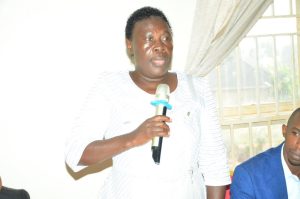 The land Act protects such as family land under section 39A and no person shall sell, exchange, transfer, mortgage, lease, enter into any contract for sale or pledge or give away any family land without any prior written consent of a spouse.
The land Act protects such as family land under section 39A and no person shall sell, exchange, transfer, mortgage, lease, enter into any contract for sale or pledge or give away any family land without any prior written consent of a spouse.
- Under polygamous marriage. Very many women are not accepted; they just form families and have children. These women are not protected under any law and are just cohabiting. The first wife is given a house, land, – Every Child to the Mother – the more the children the more the fragmentation and the less the Land.
- Inheritance from parents/by a will. (okubaganisa). boys are given land to build on and the land surrounding the house is for the girls/women in case they fail in marriage. Even when they are making wills.
- By purchase. Originally they would only be witnesses to the purchase and never co purchasers. When there is a conflict, the land would present the agreement and the wife would just be a witness and not owner.
- Okutekyesa/ ekyamahega
- Okusheba/ gift inter vivos by parents and sometimes relatives
- Ekyengaragazi
- Ekyemiziga (Consolatory piece)
Once we work together this fight is winnable and mostly because of corruption. If we are to help these women, we should do away with corruption. There is need to extend our jurisdiction and reach the farthest and help the neediest.
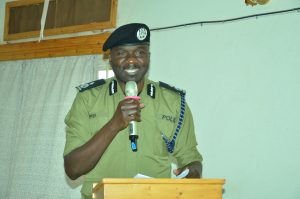 The challenge identified was language barriers faced by the Judicial officers while presiding over land cases. “For example one of the ways a woman can own land in Kigezi, is receiving a portion of her deceased father’s land called ‘Ekyemiziga” literally translated as “Consolatory land’, ” At times it is hard for the judicial officers to understand the source of land conflicts, since such kind of land acquisition does not usually involve documentary evidence, and there are limited means of interpreting them in accordance to the laws governing land management.
The challenge identified was language barriers faced by the Judicial officers while presiding over land cases. “For example one of the ways a woman can own land in Kigezi, is receiving a portion of her deceased father’s land called ‘Ekyemiziga” literally translated as “Consolatory land’, ” At times it is hard for the judicial officers to understand the source of land conflicts, since such kind of land acquisition does not usually involve documentary evidence, and there are limited means of interpreting them in accordance to the laws governing land management.
The dialogue also established that there was an increase in the number of widows facing land grabbing and evictions by their in-laws especially when their husbands die without making wills. Most of the affected widows were those cohabiting.
There was a Man who sold land without the wife’s consent and have been charged with criminal trespass because of getting to the sold land to fetch firewood. A man was also arrested because of using his land.
Emphasize what is learnt and it would be bad if someone’s land is taken and different Offices are at conflict.
Gaps identified during the engagement
- Additionally Lack of awareness and Ignorance. Lack of knowledge and information for women’s rights to land ownership land laws and the effects of violating land rights. Many women are unaware of their rights regarding land ownership and inheritance thus leading to their exploitation and marginalization. This lack of awareness often stems from limited education and outreach programs.
- Poor economic status and lack of enough finances. Due to the fact that most women live in rural areas thus land is essential for them to carry out their economic and agricultural activities for sustaining their livelihood, they lack enough finances to clearing the ,legal fees for addressing and protecting their land issues.
- The Uganda’s legal frame works on land ownership has also limited the ownership for women. Uganda has made strides in enacting laws to protect women’s land rights thus implementation remains a challenge. The Land Act of 1998 and its subsequent amendments aim to promote gender equality in land ownership, but enforcement at the local level is inconsistent.
- Land grabbing is another issues that was identified limiting land ownership. Rapid urbanisation and commercial interests contribute to land grabbing thus disproportionately affecting women who may lack the resources or legal support to defend their land rights against powerful interests.
- Polygamy and divorce. In polygamous marriages, disputes over land rights can arise upon divorce for example the death of the husband, women in these situations often face challenges asserting their claims against competing wives and male relatives.
- Discriminatory practices in rural areas. Discrimination against women in accessing land credit, loans and other financial resources exacerbates their vulnerability to land related injustices. This discrimination is sometimes perpetuated by financial institutions and even within families.
- Lack of documentation. Women’s land rights may not be formally documented thus making it easier for others to contest or disregard for claims.
- Limited participation in decision making. Women may have limited participation in decision making processes related to land governance, leading to policies that do not adequately address their needs.
- These customs are not written.
- They are unknown to the stake holders especially those 30 years and below.
- Little or no respect is attached to these customs presently.
- Enforcement of them is nearly impossible.
Lessons learned:
- Actors are acting altraviares beyond their powers.
- Legal Marriages are key in this; there is a challenge of cohabiting and this can take a lot of time…
- One of the biggest Challenges is that LCIs don’t understand their roles in the Land and Family Matters. LCII Courts are not aware of that is all about Policy and Laws.
- The Area Land Committees have no knowledge of the Land Act, Property rights or even Inheritance rights and they are acting with Authority of Ignorance
- There is an urgent need to sensitise these officers to minimize conflict at village level.
- Challenges with patriarchy norms tend to give preference to boy child calling the girl child prostitutes.
- Capacity gaps on both the citizens and duty bearers for instance ALCs do not have a budget and this implies that if there is an issue the facilitation is handled by the victim.
- Section 38A Land Act cap 227 gives a clear definition of family land
- Jurisdiction of courts to handle land matters LC 2, LC 3, Appeal to Chief Magistrate
- Grade 1 value not more 20m of the property in conflict
- Chief Magistrate 50m of the property in conflict
- High Court more than 50m of the property in conflict
- LCs only land under customary tenure
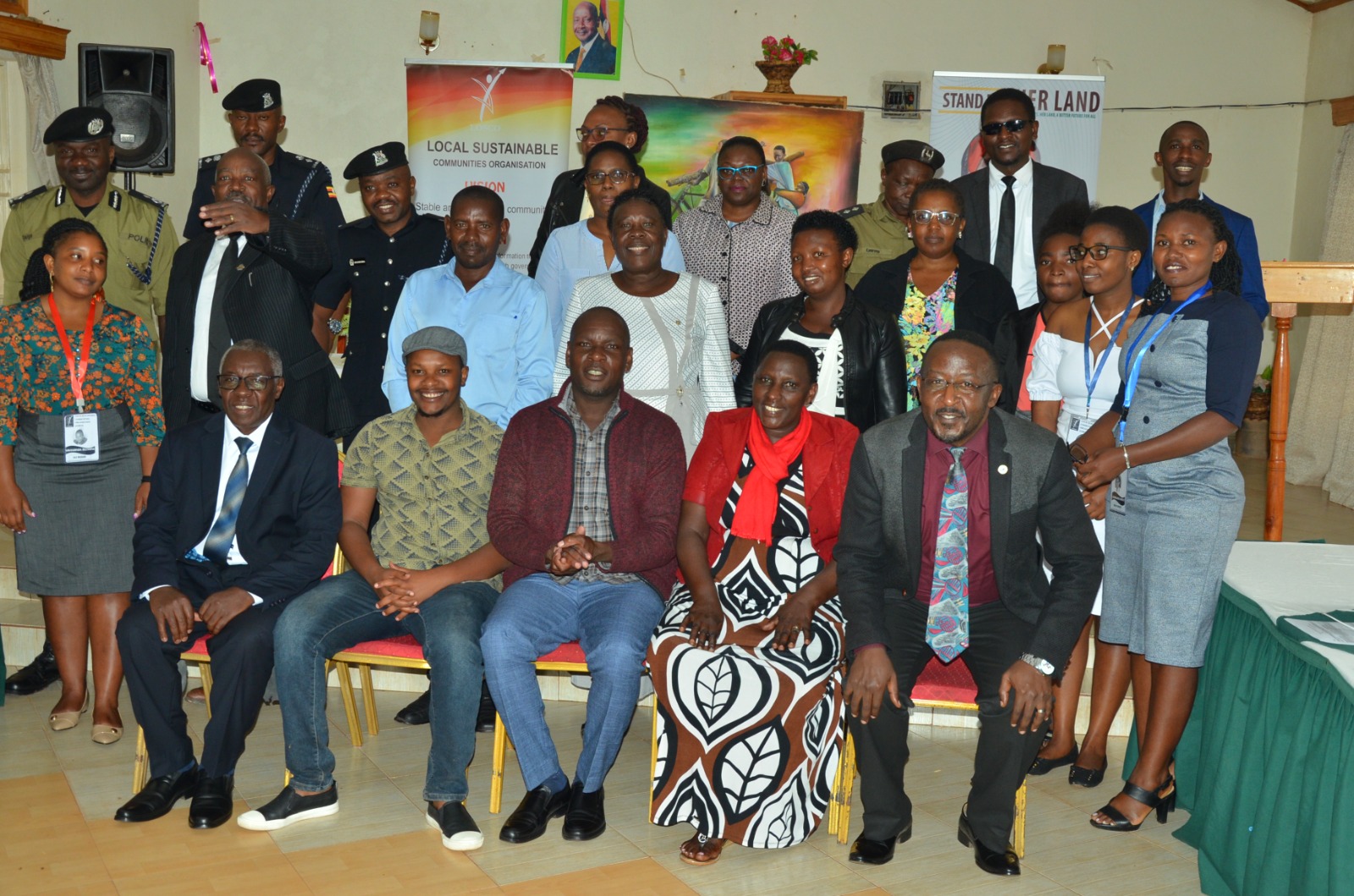
Recommendations
- Partners must continue the awareness because the information is very necessary. The matters related to land should be handled jealously. Section 39 of the Land Act should be very well explained to women and be enforced every day. This includes conducting awareness campaigns and provides education on women’s land rights and legal mechanisms for claiming them.
- Be taught how to make will and not only that but also what happens and the executors of the will and get letters of prebators
- Stakeholders and the general public to be sensitized about these customs.
- Encourage putting in writing or making written agreements of the gifts i.e. gifts inter vivos, distribution agreements, making wills.
- Encourage executors to apply for probate/ letters of administration
- All Government established structures should come with the budget.
- Local laws and policy interpretation to local languages
- Limited capacity for women should be boosted through capacity building for rural organisations of land rights and laws.
- Establish gender responsive and equitable policies on land and property rights.
- Need to implement legal land reforms. Amend discriminatory laws and policies to ensure gender equality in land ownership and inheritance rights.
- There should be need for capacity building programs. This includes building the capacity of women’s organisations and community leaders to advocate for women’s land rights and provide support to women in claiming their land rights.
- Provision of legal Aid services. Provide fee legal aid services to help women assert their land rights.
- Need to implement community sensitization. Conduct community sensitization programs to challenge discriminatory norms and promote gender equality in land rights. Engage more conversations with the local communities.
- Implement land titling programs. Land titling programs contribute to prioritize women’s land rights and ensure their inclusion in formal land registries.
- To improve access to credit and resources. Improve women’s access to credit, agricultural inputs and extension services to enhance their productivity and land tenure security.
- To encourage participatory land use planning. Ensure women’s participation in land use planning processes to address their specific needs and priorities.
- Need to strengthen legal frameworks. Strengthen legal frameworks and institutions responsible for protecting women’s land rights and ensuring their enforcement.
- There should be need to promote equity and equality for women in Uganda. Therefore there should be legal provision and promotion of equality and equity for both genders in land ownership and land rights.
Media Links
https://thesourceug.com/current-affairs/gender-based-land-conflicts-surge-in-kabale/


Leave a Comment